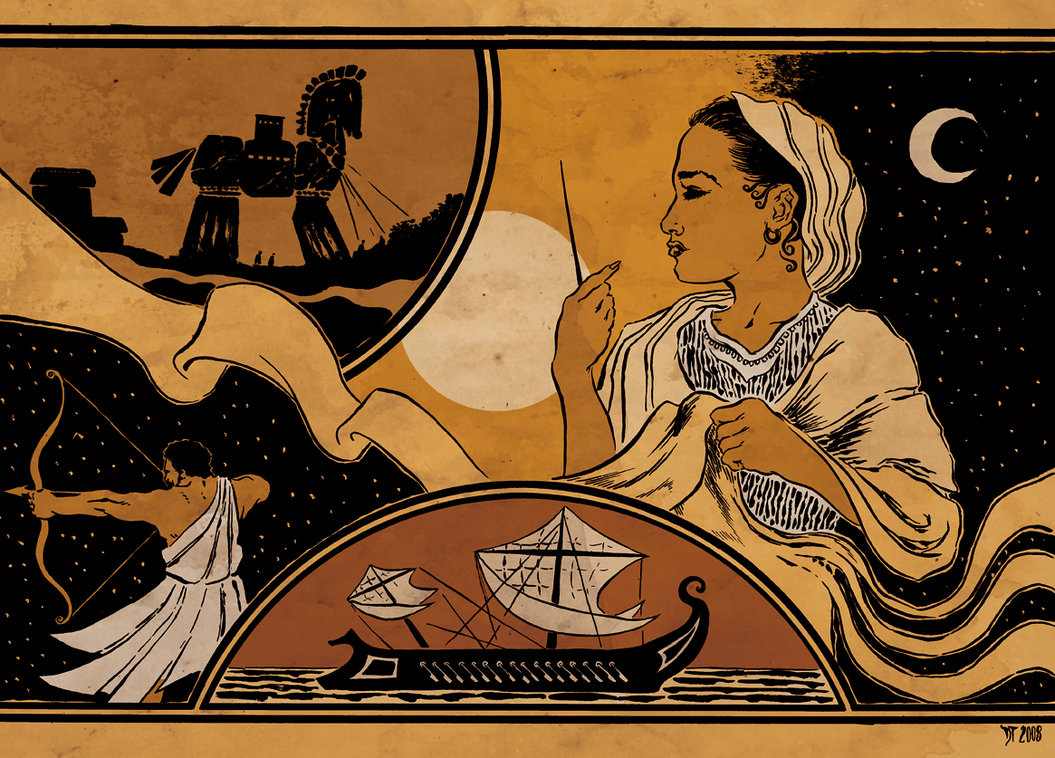By: Michael Grenke
The Odyssey’s Penelope is a Thinker, a person who is effective in facing her world and its problems by thinking her way out of them. She is, perhaps, even more of a thinker than her much-devising husband, as he is still, occasionally, given to “solving” his problems with brute force. It is in Penelope that Homer more purely explores the possibilities and limitations of Odyssean cleverness. The emblem of Penelope’s cleverness is the device by which she tricks her suitors for three years, her weaving. She uses the weaving to buy herself time, but the weaving is itself an image of time. Time is a weaving and unweaving; it makes and unmakes beings and relations. In her deception, Penelope gives the impression time has no consequence for human beings. And understood thus, time poses a great difficulty that attends and deforms the kind of thinking in which Penelope engages.
In the so-called digression of the Theaetetus (172d), Socrates sketches an extreme image of the upbringing of a philosophic human being. There the phil-osophic human being is brought up in isolated innocence. They are not exposed to or involved in any of the daily concerns of the political or legal system. These human beings, alone, says Socrates, are free. Every other human being, says Socrates, is a slave. More literally they are slaves to time. And expressed in more Greek fashion, they are slaves to the water clock. All of their actions and their thinking, all of their problem solving, is on a timer.
To be free one must be able to do what one wants. But in order to be able to do what one wants in the fullest sense, one must know what one is doing. Only those who are not concerned with the matters of the day, the week, the year are free to think about a problem for as long as the problem deserves. Only a thinker who is at leisure thinks about a problem with no limitations other than those that define sound thinking itself. Only such a thinker can delay their conclusion until the thinking itself merits a conclusion.[1] All others are under the pressure of some deadline, the pressing down of the flowing water of time. This pressure distorts their thinking in one way or another. It makes them proclaim a finish to the thinking when more thinking is needed. It makes them proclaim a matter finished when more argument or more evi-dence is needed. This pressure leads to bad thinking, and according to Socrates it makes human beings “become small and not upright in their souls.”
Human beings become slaves to the clock mostly because other human beings put them on the clock. In one of his notebooks from 1882, Nietzsche writes “Madness is rare with individuals – but with groups, parties, peoples, times it is the rule.” The word for madness here is Irrsinn,[2] literally erroneous thinking, or more loosely bad thinking. What Nietzsche seems to have in mind is that our intercourse with other human beings pressures us to adopt illegiti-mate modes of thinking. We must agree or, more accurately, pretend to agree about many matters regardless of whether we have the resources and have utilized those resources to come to a well-founded conclusion. Human beings do not feel secure in the proximity of other human beings who do not agree with them. Such agreements are demanded by social life, and they are demanded on a time table deter-mined by the feelings of the human beings, not by the epistemological requirements of the matter under consideration. Who is comfortable with a neighbor who does not respect property rights, or does not endorse the prohibition against cannibalism, or who openly admits that they do not know what justice is? In general, who is comfortable living near human beings who do not hold a massive host of opinions shared in rough outline by the whole group?
It is bad thinking to declare a matter resolved before it is resolved. It is a mental defect to think one knows what one does not know. Yet it seems that social life pushes our thinking into this premature and self-deceiving form. Not only that, the matters that society demands we resolve are matters that move our passions deeply. Thus we see exhibitions of great anger and agitation in our efforts to govern ourselves. Governing demands results. Results are not answers. The clearest thing is that strength of the passions is out of proportion with the fullness and soundness of the thinking that backs our claims. We very often do not know, but when another human being disagrees with us, we act as if we do know and as if they ought to know. We would never demand that a human being give a solution to an equation before they had actually worked it out, but in many matters of much greater concern to us we demand something like that from our fellow human beings. We put them on the clock. We impress upon them habits of bad thinking. And we invest the situation with great passion and grave consequences.
Her suitors have put Penelope on the clock. They are aggressive and avaricious. They are perhaps reversions to the piratical character of the early Greeks. They are perhaps the result of a generation of young Greek men who have come up, thanks to the war, without the benefit of the guidance of the previous generation. They are perhaps just a flaring up of unfiltered human nature, opportunistic predators that see something desirable (authority in Ithaka, wealth, a beautiful woman) undefended and are not sufficiently inhibited by conventions that have no force to back them up. It is unsafe not to come to some kind of agreement with such suitors.
Although Penelope is not wholly opposed to coming to some kind of arrangement with the suitors, she tries to delay them. She tries to put herself in a situation where there is more time to think more fully and on more sufficient grounds. She tries to defend her marriage, but what is she defending? The fate of her husband is unknown. No contact for nearly 20 years. What have they shared? What have they done together? Nothing. Each has been married to the other separately. Because of their separation their marriage is devoid of change, it is time defying and thus is allied to the leisurely realm of purer thinking. But it is not just their special circumstances that makes this so. Their marriage is meant to be once and for all. Perhaps most marriages are meant to be time defying. Odysseus embraced this thought when he built his immovable bed. However such a marriage is not aiming at the kind of unchanging character that belongs to undying beings. When Odysseus defends his marriage, he does so against the offer of marriage to a goddess. Immortality comes with this offer. But when Homer gives us a glimpse of Odysseus reasoning about Calypso’s offer it is clear he is measuring marriage to the goddess against his existing marriage to the mortal Penelope.
This attempt to have something lasting and stable, but still transient and mortal may offer some form of compromise with the pressure that time exerts on our thinking. For it is not just the suitors that put Penelope on the clock. It is her mortality also. Loyalty to a person can lose its substance if that person no longer exists. And her Odysseus may be dead or so changed as to no longer be hers. Even if this is not the case, there is a cost to loyalty. Even when her Odysseus has returned, Penelope laments that the gods did not allow them to enjoy their youth together (XXIII, 211). One sees this cost even more clearly in the touching scene with Odysseus’s dog Argos. The dog was bred by Odysseus, and he is its master; it has clung to life loyally, it has waited 20 years to die only when its master returns. But they have not shared life with one another. How much better off Penelope is may just be a fortunate accident of her span of life.
Penelope’s marriage is a thought, and not a thought fully founded upon adequate thinking and evidence. She has chosen to remain loyal to this thought even though aware of its inadequate founding. We can see this in the way that she comes to recognize that her Odysseus has returned. It is unlike the other recognition scenes. A distinctive scar may be enough to mark an individual as singular, or performance of a feat that only he can do may be enough. But this is not how Penelope recognizes that her Odysseus has come back. When she pretends to order that their immovable marriage bed be moved, Odysseus responds with strong anger. It is his emotional response, not his knowledge of the details of a material secret, that convinces Penelope that her Odysseus is back. The marriage of these two, impressive and inspiring as it is, exists primar-ily in the realm of thought and feeling. And thus it is fragile; if Odysseus had not returned when he did, waiting for his return would not have been the best choice.[3] But the fragility of such a marriage does not mean the marriage is not a real thing. We can and do live substantially within our thoughts. Since this is our situation, we should take as much care as we can regarding the quality of our thinking.
Michael Grenke is a tutor at St. John’s College. This article was originally published in The College Magazine, a publication for the alumni of the college.
[1] This is why sabbaticals are so important to those who wish to live the life of a learner. They are not vacations. They are times designed to approxi-mate as much as possible the leisure that allows a thinking being to think according to the criteria of thinking alone.
[2] Compare Beyond Good and Evil 156 where Nietzsche makes a similar claim. There he uses the word Wahnsinn.
[3] Among other things, it would likely have cost Telemachus his life.
Image: Penelope by Diego Tripodi










Leave A Comment